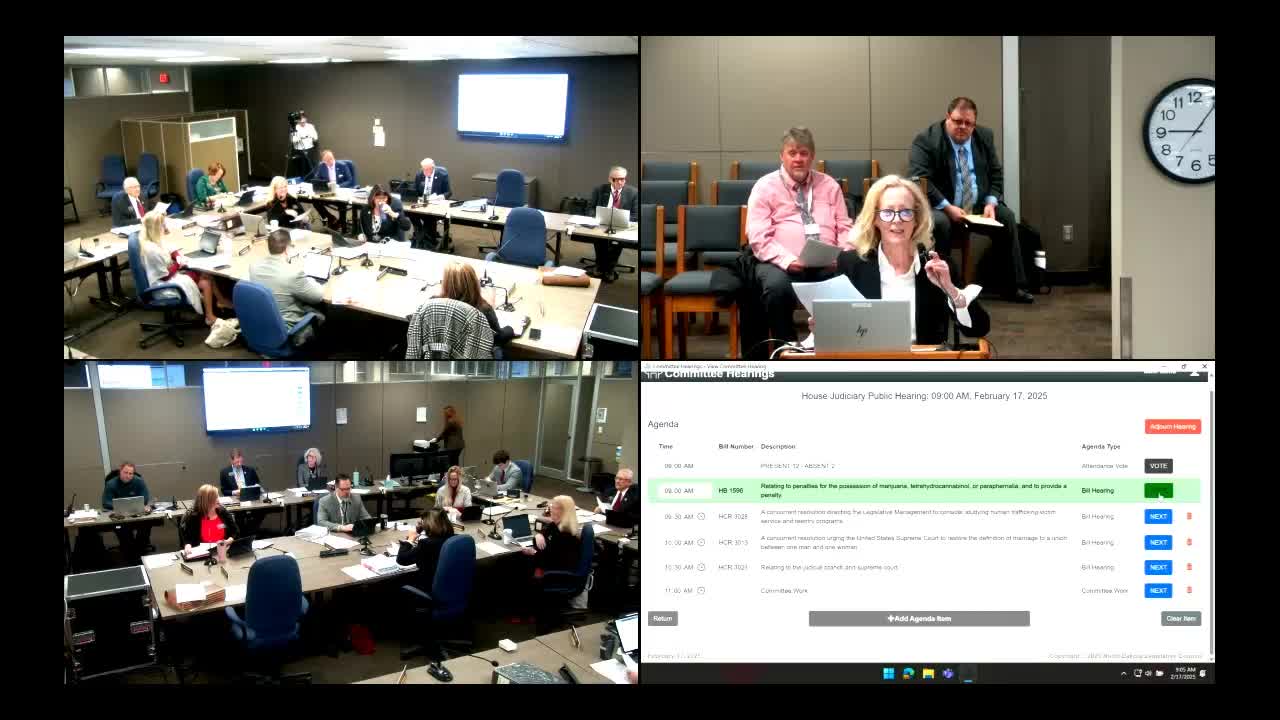House Judiciary Committee hears bill to reclassify low-level marijuana possession as noncriminal citation
Get AI-powered insights, summaries, and transcripts
Subscribe
Summary
A bill sponsored by Representative Liz Conmey would lower some possession thresholds and create a traffic-like citation process for the smallest amounts of marijuana and THC, seeking to reduce court and prosecutor workload; law-enforcement and public-safety groups told the committee they have concerns about deterrence and repeat offenders.
Bismarck — The House Judiciary Committee held a hearing on House Bill 1596 Thursday, advancing debate on a proposal to make the lowest-level marijuana and THC possession offenses noncriminal citations and to lower the adult age for certain ingestion infractions from 21 to 18. Representative Liz Conmey, bill sponsor, told the committee the measure responds to recommendations from state's attorneys and law-enforcement officials across North Dakota who say courts and prosecutors are overwhelmed by cases involving small amounts of marijuana.
Conmey said the bill changes possession thresholds so that the smallest possession ranges (for example, less than half an ounce of marijuana and less than 2 grams of THC) would be treated as noncriminal citations payable by fine, and that juvenile infractions would remain within juvenile court jurisdiction. "HB 15 96 is the result of suggestions from state's attorneys in Cass County, Stark County ... regarding the congestion in our state's attorneys' offices, our judicial services, and also the overwhelming demands on law enforcement professionals when it comes to dealing with small amounts of marijuana," Representative Conmey said.
The bill keeps higher possession levels as misdemeanors and leaves the Class A misdemeanor thresholds unchanged. It also creates an adjudication process for citations patterned on traffic violations, with a statutory fee of $150, an option to post bond and request a hearing, and an avenue to seal certain records after two years if no new convictions occur.
Supporters told the committee the bill would reduce court appearances, public-defender appointments and hearings for very low-level cases. Jonathan Byers, representing the North Dakota State's Attorneys Association, urged amending the bill language to set the fine at a fixed $150 (removing the phrase "up to $150") so judges would have a clear statutory fee rather than variable amounts. Travis Fink, executive director of the North Dakota Commission on Legal Counsel for Indigence, said his agency supports the effort to reduce indigent-defense caseloads and cited prior examples where moving offenses to noncriminal citations reduced court processing and public-defender appointments.
Opponents included Stephanie Ingebretsen of the Chiefs of Police Association of North Dakota, who said changing the lowest-level offense to a noncriminal citation risks undermining deterrence. "There is a concern that someone continually, repeatedly does this conduct, and if they can afford to pay $150 they'll just continue to take the penalty when they get caught," Ingebretsen said, noting current infraction-level penalties can be up to $1,000 and that repeated infractions can escalate to misdemeanors under present law.
Committee members asked about how repeat offenses are handled; Conmey said the bill includes provisions to escalate penalties on subsequent offenses. Representatives also discussed amendments the sponsor said had been drafted by Legislative Council and would be circulated to the committee before action. The committee did not take a final vote on HB 1596 at the hearing and left open the possibility of amendments and a committee action later in the week.
